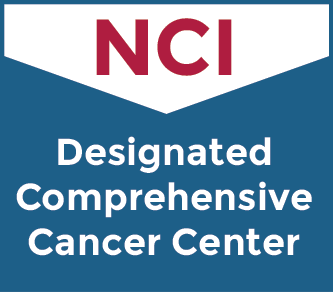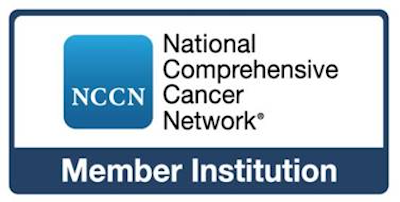The UCSF Helen Diller Family Comprehensive Cancer Center is proud to be designated a comprehensive cancer center by the National Cancer Institute, which is part of the National Institutes of Health.
 The “comprehensive” designation—NCI’s highest ranking-is awarded after a rigorous evaluation process which shows that the center pursues scientific excellence and has the capability to integrate diverse research approaches to cancer. Criteria include:
The “comprehensive” designation—NCI’s highest ranking-is awarded after a rigorous evaluation process which shows that the center pursues scientific excellence and has the capability to integrate diverse research approaches to cancer. Criteria include:
-
Strong basic laboratory research in fields such as biology, chemistry, immunology, and molecular genetics.
-
The ability to turn research findings into clinical practice.
-
A record of innovative clinical research studies in the communities served by the center.
-
Conducting high-priority clinical trials for therapies with unusual promise.
-
Strong research programs in cancer prevention and control.
-
Research training and continuing education for health care professionals.
-
A wide range of cancer-information services for patients, health professionals and the community.
-
A commitment to community services and outreach related to cancer prevention and control.
The NCI Cancer Advisory Board, whose members are appointed by the president, must recommend cancer centers for comprehensive designation. The designation is re-evaluated every five years to ensure that centers continue to meet the institute’s standards.
For more information, visit the NCI Cancer Centers Program website, where there is a list of all NCI-designated cancer centers. The institute’s overall website at www.cancer.gov is the most authoritative source for cancer information, including advances in treatment, supportive care, screening and prevention, and information on clinical trials.
Commission on Cancer®
Cancer programs at UCSF have been continuously accredited by the Commission on Cancer of the American College of Surgeons since 1933. The commission is a consortium of professional organizations dedicated to reducing occurrences of and deaths from cancer through education, and by setting standards for and monitoring quality, multidisciplinary, patient care. Eighty percent of those diagnosed with cancer each year are diagnosed and treated at commission-approved programs. Cancer programs, like those at UCSF, voluntarily participate in the commission’s Approvals Program and meet 36 standards of quality patient care. The result is that UCSF is among a select group of institutions that have achieved the highest level of accreditation. Our patients can be assured of: a multi-specialty, comprehensive, team approach to coordinating the best treatment options; treatment with state-of-the-art services and equipment; access to the latest clinical trials; and the best cancer-related information, education, and support services.
National Comprehensive Cancer Network
UCSF is a member of the National Comprehensive Cancer Network, an alliance of the world’s leading cancer centers. The network brings together leaders in oncology treatment and research to improve and facilitate quality, effective, equitable, and accessible cancer care. Through the collective expertise of its member institutions, the network develops, updates and disseminates clinical practice guidelines, which are the standard for clinical policy in oncology. For more information, visit the NCCN online.
Association of American Cancer Institutes
As a member of the Association of American Cancer Institutes, the Helen Diller Family Comprehensive Cancer Center has joined with leading U.S. cancer research centers to support a comprehensive and multidisciplinary program of cancer research, treatment, patient care, prevention, education and community outreach. Centers affiliated with the association are dedicated to translating promising research findings into new ways to prevent and treat cancer. The ultimate goal is to ease the burden of cancer on patients, families and communities. For more information, visit AACI online.


